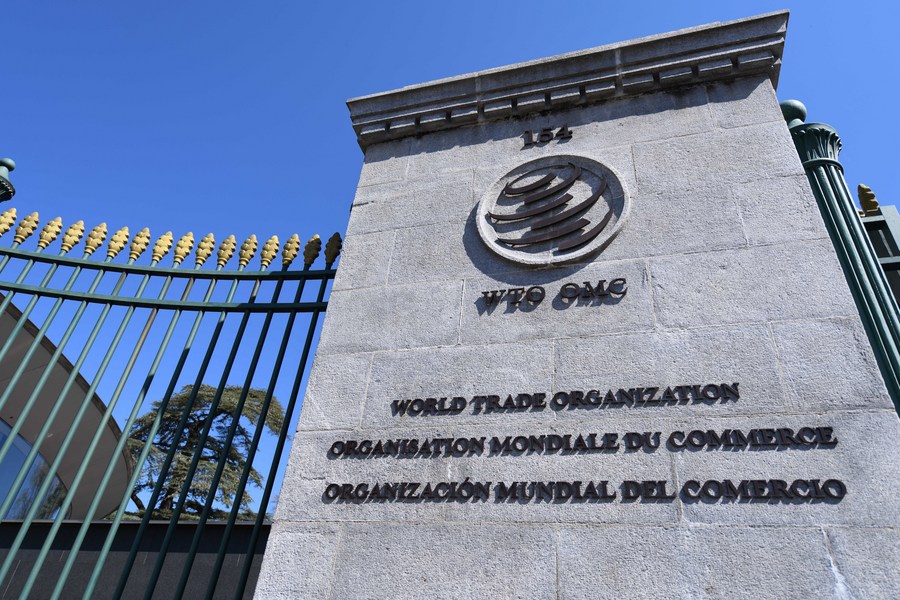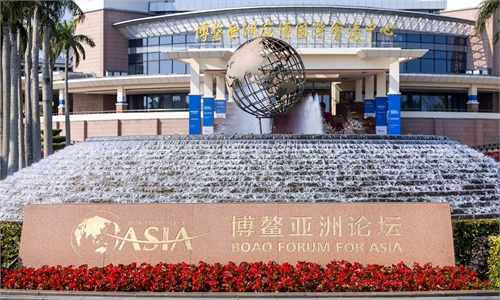
A logo of the World Trade Organization (WTO) is seen in Geneva, Switzerland, on April 5, 2023.
Today, amid the tariff war, we witness the emergence of throwaway lines about the "end of globalization." If we mean globalization defined by the dominance of the transatlantic economies, then that happened some time ago. Some have leaped on the notion of the "end of globalization," but the evidence suggests that something else is happening.
Rather, we now have the end of "globalization with Western characteristics," and the beginning of "globalization with multipolar characteristics." It is a new chapter of globalization in which the US and the Western powers are decentered. But it is not a retreat into a state of autarky, though perhaps it could be argued that the current spate of tariffs issued by Washington speaks to a temporary retreat of the US from intensified global interactions.
Globalization with multipolar characteristics is one of intensified international relations through ongoing and expanded trade (with or without the US), growing capital flows via diversified sources, and a network of multipolar institutions at regional and sub-regional levels providing economic and security governance architecture. The tariff war, initiated by the current US administration, creates the conditions in which this form of multipolar globalization is accelerated. The cornerstone of this unfolding phase of international interactions will be intensified cooperation.
China's growth as a global manufacturing superpower and major trading partner for over 150 nations is the preeminent feature of today's globalization. Its economic linkages and overall heft create ballast when the global economic system has been disrupted as it has been, and its institutional steady-hand acts as an enabling focal point for nations to coordinate their actions. China can and should continue to open its market to others, providing alternative opportunities for enterprises around the world.
Globalization with multipolar characteristics can be enhanced and accelerated through a focus on the following initiatives.
In terms of trade, nations need to remain committed to the World Trade Organization and subordinate regional multilateral and bilateral arrangements and agreements. These institutions need reform to ensure they are suited to modern times, but are foundational to the multilateral trading arrangements that have benefited the world for many decades. Additionally, committing to these institutions demonstrates that countries are "good for their word" and that for them, agreements matter and are dependable. This is crucial in an environment where capricious actions undermine trust in counterparties.
Furthermore, nations need to focus on expanding trade cooperation. This means coordinating their actions domestically to optimize supply chain alignments, and ensuring that trade delivers mutual benefits and meets the development aspirations of participants. With short-term trade disruptions occasioned by tariff-based uncertainties, coordinated fiscal measures can be mobilized to provide a consistent compensatory boost to demand as the US market becomes less dependable.
Trade can also be boosted through ongoing work to enhance transnational digital standards for supply chain data. This provides regulatory agencies - such as customs - with transparent, dependable data on trade consignments enabling fast-tracked processing, and buyers and their financial stakeholders with streamlined data-enabled payments and settlements.
Facilitating trade growth must also go hand-in-hand with enhancing capital flows to support the development of the Global South. Financing development via the traditional post-Bretton Woods institutions of the World Bank and IMF has largely failed to alleviate global under-development. These institutions need to be reformed so that the voices of the Global South can more effectively be heard. At the same time, new national currency-based development financing institutions are needed to enable the mobilization of critical human capabilities and technologies to tackle historic uneven development and dependency. The New Development Bank established by BRICS countries, and other multilateral financial institutions such as the Asia Development Bank among others, can be propelled to take on greater responsibility in financing development.
Lastly, globalization with multipolar characteristics needs security institutions that are focused on indivisible security and the security of all, rather than on institutions that frame the world in zero-sum security games. A United Nations true to its founding charter is worth working collaboratively towards, rather than being jettisoned in haste. The principles championed by China in its five principles of peaceful co-existence, as well as those advocated by the Bandung conference of the non-aligned movement, can be marshaled to provide a focal point for a new style of governance and statecraft.
"Globalization with Western characteristics" may well be coming to an end. However, with concerted efforts to intensify coordination and collaboration, the benefits of "globalization with multipolar characteristics" can be better shared across the globe.
The author is an adjunct professor at the Queensland University of Technology, a senior fellow at Taihe Institute and a former advisor to Kevin Rudd, former Australian prime minister. opinion@globaltimes.com.cn


